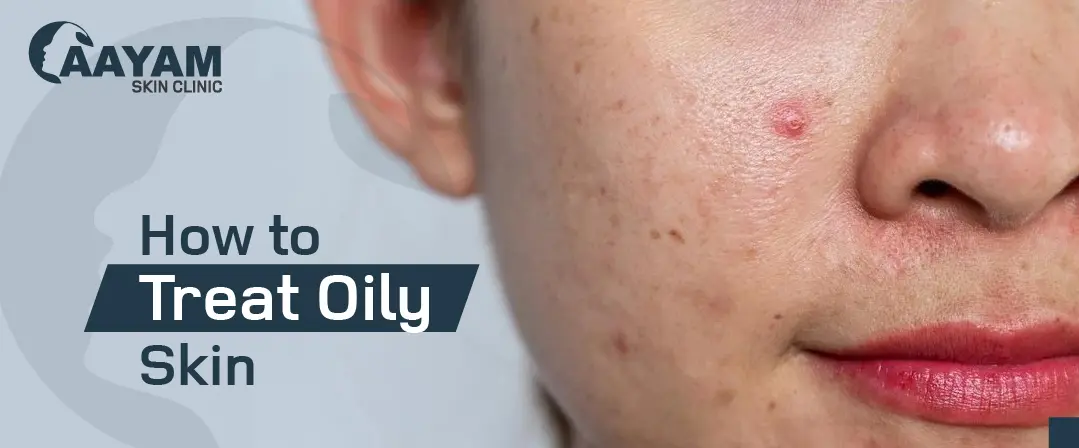How to Treat Oily Skin

It is difficult to maintain oily skin. Even a single day with oily skin can lead to at least a minor breakout, clogged pores, or an oily tone. While the skin needs some sebum for a healthy moisturized look, excess production may cause a skin problem or several problems to persist on the skin.
Causes of Oily Skin
The sebaceous glands produce excess sebum, which surpasses the cutaneous physiological needs in excessive oil production. The oil helps protect and moisturize the skin; however, when production goes haywire, it can ruin skin with oiliness, acne, and enlarged pores.
Let Us Help Identify Some Common Causes of Oily Skin:
- Genetics: If the oily skin has a family history in your family, then the likelihood of inheriting it is great.
- Hormonal Changes: Hormonal imbalances during puberty, menstruation, pregnancy, and menopause can lead to increased production of sebum.
- Stressful Situations: Too much stress can stimulate excess oil production by activating the adrenal glands.
- Hot and Humid Conditions: The heat and humidity together can worsen oiliness.
- Improper Skin Care Products: Heavy, oil-based products can inhibit oil skin production.
Best Skincare for Oily Skin
A well-structured oily skin care routine can help control excess oil, prevent acne, and maintain a healthy glow. Follow these essential steps to keep your skin balanced and oil-free:
- Cleanser: Opt for a Gentle Foaming Cleanser - Cleansers are extremely important for erasing extra oil, dirt, and impurities on the skin. Clean the skin with a mild, oil-free foam cleanser containing salicylic acid or glycolic acid, which dissolves the buildup through temporary effects. This is to keep pores unclogged and avoid breakouts.
Recommendation : Wash the face morning and evening to prevent oil buildup.
- Toner: Balance oil production - A toner removes any remaining impurities and tightens the appearance of the pores. Choose alcohol-free toners endowed with witch hazel, tea tree oil, or niacinamide to regulate oil output and soothe inflammation.
Recommendation: Use a cotton pad, dispense some toner, and glide it gently across the face.
- Serum: Controls oil and reduces pore size - Oil-reducing, pore-tightening acne serum ingredients such as niacinamide, salicylic acid, and retinol also prevent acne.
Recommendation: Apply target serum on oily zones after toning.
- Moisturizer: Hydrate Without Clogging Pores - Moisture is as much a necessity for oily skin as for any other skin type. Use a lightweight, oil-free, and non-comedogenic moisturizer to hydrate the skin without clogging pores. Look for ingredients such as hyaluronic acid or aloe vera for maintaining moisture balance.
Tip: Gel moisturizers are preferred for oily skin.
- Sunscreen: Protects from UV Damage - Sunscreen is still an essential component even for oily skin. Look for a broad-spectrum sunscreen with a matte finish, SPF 30 or higher, that protects against sun damage but does not increase the sheen of the face.
Tip: Look for mineral-based sunscreens for a matte effect.
Oily Skin Treatment at Home: Natural Remedies to Try
If you prefer a natural approach, several oily skin home remedies can effectively control oil production and keep your skin fresh.
1. Clay Masks Clay masks, such as bentonite or kaolin clay, help absorb excess oil, unclog pores, and reduce shine.
How to Apply :
- Mix any clay powder with rose water or plain water to obtain a batter-like consistency.
- Spread over the face for 10-15 minutes.
- Rinse off using lukewarm water.
2. Honey and Lemon Mask for Antibacterial Benefits Honey possesses antibacterial properties, and lemon aids in the control of oil and the brightening of the skin.
How to Apply :
- Take one tablespoon of honey and mix it with a few drops of lemon juice.
- Apply it to your face for 10-15 minutes.
- Rinse off with warm water.
3. Aloe Vera Gel for Soothing and Hydration Aloe vera acts as a natural astringent which reduces oiliness while maintaining skin hydration.
How to Use :
- Directly apply fresh aloe vera gel on the face at bedtime.
- Leave overnight and rinse with water the next morning.
4. Apple Cider Vinegar as a Natural Toner Apple cider vinegar has antibacterial and astringent properties that help balance oil production.
How to Use :
- Mix equal parts of apple cider vinegar and water.
- Apply it as a toner using a cotton pad.
- Rinse after 5-10 minutes.
Tips to Manage Oily Skin Effectively
Adopting the right skincare habits can prevent excessive oiliness and keep your skin looking fresh and clear.
- 1. Avoid washing your face more than twice a day : Washing your face more than twice will not be good for your skin as it will remove the oil on the surface of your skin and make sebaceous glands produce more oil in compensation.
- 2. Oil-Free and Non-Comedogenic Products : Prefer using lighter, water-based and non-comedogenic skincare and makeup products for pore-clogging and worsening oiliness.
- 3. Blot Oil : Blotting papers help absorb excess oil throughout the day, without disturbing your makeup.
- 4. Exfoliate 2-3 Times a Week : An Exfoliation helps to remove dead skin and avoids the clogging of pores. Use a mild exfoliating agent-containing salicylic acid or glycolic acid for oil buildup.
- 5. Stay Hydrated and Eat a Well-Balanced Diet : Drink lots of water and consume foods that are rich in vitamins and antioxidants so that your skin remains in good health.
How to Reduce Oily Face: Effective Strategies
In case you are wondering how to cut down oily face effectively on a long-term basis, then following a regular regimen of skin care with some of the very simple methods will give you a very good result.
- 1. Use Oil-Control Face Washes: Pick a face wash specifically made for oily skin and infused with tea tree oil, salicylic acid, and/or benzoyl peroxide.
- 2. Use Mattifying Primers and Powders: Use a mattifying primer before makeup application to control oil and shine. Finish your look using a lightweight, oil-free powder to lock in a matte finish.
- 3. Use Oil-Free Moisturizer and Sunscreen: Hydration is very necessary to control oil production. Select a hydrating gel-based moisturizer and a light sunscreen that won't make your skin feel greasy.
- 4. Avoid Heavy Makeup: Steer clear of heavy oil-based foundation products that can block pores and increase oiliness. Choose mineral-based and breathable products.
Products for Oily Skin: Must-Have Recommendations
Choosing the right products for oily skin can make a significant impact on managing oiliness and preventing breakouts. Here are some top product recommendations:
1. Cleansers for Oily Skin
- Cetaphil Oil Control Foam Wash
- Neutrogena Oil-Free Acne Wash
- La Roche-Posay Effaclar Purifying Foaming Gel
2. Toners for Oily Skin
- Thayers Witch Hazel Alcohol-Free Toner
- The Ordinary Glycolic Acid 7% Toning Solution
- Paula’s Choice Pore-Reducing Toner
3. Moisturizers for Oily Skin
- Neutrogena Hydro Boost Water Gel
- Cetaphil Oil Control Moisturizer
- Clinique Dramatically Different Moisturizing Gel
4. Sunscreens for Oily Skin
- La Roche-Posay Anthelios SPF 50
- Neutrogena Clear Face Sunscreen SPF 55
- Biore UV Aqua Rich Watery Essence SPF 50+
Oily Skin and Acne: Managing Both Conditions
Oily skin has a tendency to clog pores that lead to acne. It is ideal to add acne ingredients into your regimen to fight both oily skin and acne.
Ingredients That Answer Most Problems for Oily Acne-Prone Skin:
- Salicylic Acid: Cleanses the pores and reduces oils.
- Benzoyl Peroxide: It usually kills the bacteria associated with acne.
- Retinoids: They promote cell turnover and ward off breakouts.
Conclusion
Achieving balance in controlling oily skin requires a little bit of everything, including an appropriate skin care routine, home remedies, and lifestyle changes. The trick here would be strictly following a regimen that both treats excess oil and keeps the skin in a hydrated state. According to Aayam Skin Clinic, it is essential to use a gentle cleanser, an oil-free moisturizer, and non-comedogenic products for effective oil-control and break-out prevention.
Home remedies such as clay masks, aloe vera, or rose water would absorb extra oil and cool the skin. Maintaining a balanced diet along with proper hydration and shielding oneself from harsh products is equally helpful in maintaining healthy skin.






